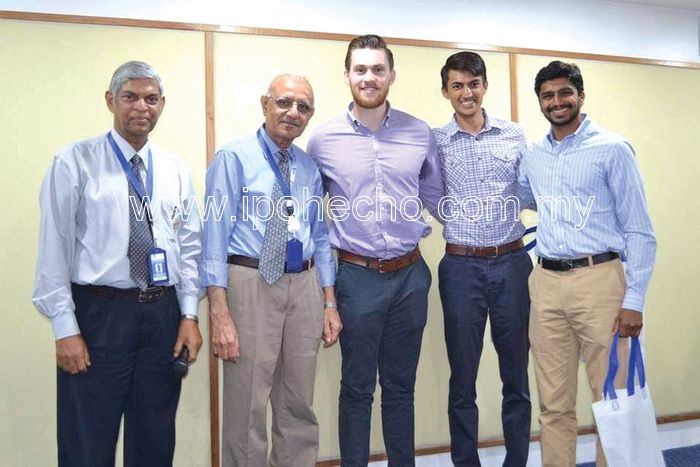

Perak Academy (PA) hosted a talk titled, ‘Medicine and Humanity’ presented by three soon-to-be doctors from THE University of Pittsburgh, Pennsylvania on Friday, April 14.
The two-hour talk, which is a part of PA’s ‘Perak Lecture Series’ was held at Quest International University Perak (QIUP) and was attended by over 50 people, most of whom are QIUP’s medical students.
The three young speakers were Arjun Prabhu, Benjamin Ware and Akash Goyal. They will graduate in May and will commence their residency training soon after. The trio shared their inspiring experiences while on practical training at different hospitals in the USA.
The talk began with Arjun Prabhu, 28, who did his clinical internship at a hospital in Pittsburgh and another in California.
“I did four weeks rotation at emergency in these two hospitals. Traumatic injuries and some really sad people, especially inmates from local jails, would walk into the ward. In California, I came across a lady who killed her own children when she was high on methamphetamine. It’s a huge problem in California,” he remarked.


Although he did not have answers for the problems his patients were battling, what he did was to listen to what they had to say. “Listening to people’s problems is one way to treat patients,” Arjun intimated.
As for Benjamin Ware, 25, he had a challenging experience dealing with a patient suffering from acute pancreatitis. The guy chased him out of his room each time he came on his rounds.
“As a physician, you’ll meet all sorts of patients. The reality is, you’re not going to get along with every single one. But despite this, you’ve to realise that your responsibility, as a physician, is to care for people. I forced myself to give extra time for this rude patient of mine,” he said.
For Akash Goyal, 25, he believes all human beings have something valuable to contribute to the field of medicine. It does not matter at what level you are.
While on cardiology ward rotation, Akash met a 78-year-old lady who was a former English professor. He struggled to gain the lady’s confidence. Patients’ qualifications and credentials differ, and getting their attention may not be easy.
Akash had just finished his pre-clinical years and his medical knowledge was inadequate. The lady’s disease was complicated and not knowing much, he made extra effort to research on it.
“One day her husband told me that his wife had a problem accessing her e-book library. He requested for technology support from the hospital.”
Akash had a look at the gadget and found that it was low on battery. He plugged it to the wall socket and, presto, it was working again. The patient smiled.
“The husband said that this was the first time he saw his wife smiling. He thanked me profusely and said that I had done more for his wife than any other physicians had. Unfortunately, she passed away three days later.
“Connecting with your patients goes beyond medical knowledge,” he concluded.
Nabilah Hamudin


